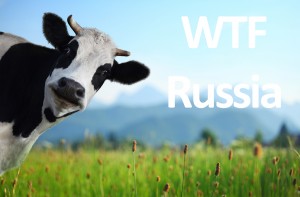Soon after the fall of the Soviet Union, Russians enjoyed the many food items that other countries export, such as delicious French cheese, scrumptious Canadian maple syrup and renowned Italian ham. Over the course of the next year, Russians will yet again have to do without.
In response to the sanctions being applied against the Russian Federation, the country said that it would be imposing fresh food sanctions on the United States, Canada, the European Union, Australia and other countries for one year.
The prohibited items include meat, fish, milk and dairy products and fruits and vegetables, according to Russian Prime Minister Dmitry Medvedev, who also threatened airspace retaliation as well. This is the answer to the sanctions against its finance, defence and oil sectors because of Russia’s presence in Ukraine.
“For a long time, Russia has not responded to the so-called sanctions declared against it by certain countries,” Medvedev told government officials. “Until the last moment, we hoped that our foreign colleagues would realize that sanctions lead to a blind alley, and that no one benefits from them. But they didn’t realize this, and now we have been forced to respond.”
 Officials say it’ll hurt Russians more than it will the intended targets.
Officials say it’ll hurt Russians more than it will the intended targets.
Abdolreza Abbassian, a senior economist with the United Nations Food and Agriculture Organization, told Reuters that both sides will suffer the consequences of government policy. “The first casualties would be the domestic market. However it will have some implications for the farmers in the producing countries.”
Although politicians say that suppliers in the listed countries won’t be very much affected, there are pockets of the economy that will experience hits. For instance, pork producers in Canada will lose approximately $500 million as Russia is one of its biggest markets.
“It becomes a huge concern for producers, because any time pork product backs up at the packers, that generally relates to a lower price paid to producers,” said Karl Kynoch, chairman of the Manitoba Pork Council, in an interview with the Canadian Press.
“Hopefully, with the good relationships that our packers have with other countries, they can … redirect the pork product into other good markets sooner rather than later.”
Canadian Industry Minister James Moore said that the federal government would examine the effects of these sanctions on the national economy, but it wouldn’t make much difference in its position against Russian President Vladimir Putin. Moore reiterated the importance of standing tall against Moscow.
Russian merchants are already concerned about how they will serve their customers, zoos are worried they won’t be able to feed their animals and restaurateurs are wondering how to serve parmesan cheese with their pasta dishes – one man told the Wall Street Journal that restaurants who have incorporated Western meals into their menus will be impacted but have to adapt nonetheless by switching ingredients.
However, Russian Agriculture Minister Nikolai Fyodorov attempted to reassure the general public that nothing would really change because the government is in negotiations with countries that are not on the sanctions list about the possibility of importing food.
“Just as you used to eat in good restaurants,” added Fyodorov, “so you will continue to eat your fill. Bon appétit.”
Meanwhile, European stocks were substantially dropping amid the Russian fiasco and the violence transpiring in Iraq. Germany’s Dax, for example, fell below 9,000. The Japanese Nikkei Average declined three percent and the Stoxx 600 plummeted 2.5 percent this week.



